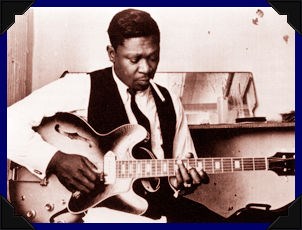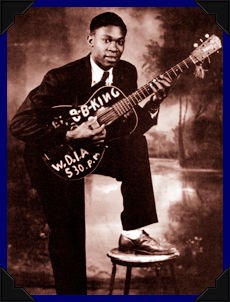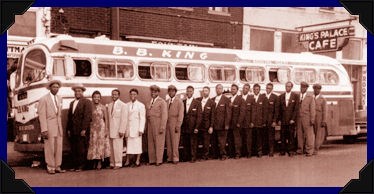
Born on September 16, 1925, on a plantation near Itta Bena, Mississippi, King was one of five children. His parents separated when he was four, and he moved with his mother to the hill country town of Kilmichael, Mississippi. Her death in 1935 forced Riley to move in with his maternal grandmother, who taught him to sharecrop. An aunt with a Victrola gave him an early introduction to records by blues greats Lonnie Johnson and Blind Lemon Jefferson.
King's first exposure to music was gospel singing in church. Archie Fair, a sanctified preacher from a local Pentecostal church, played the first electric guitar King ever heard. Fair taught him a few chords, but the youngster's voice was his favorite instrument. He soon formed his first gospel group, the Elkhorn Jubilee Singers. In 1940, King's grandmother died and he briefly returned to his father's custody before returning to his mother's relatives, the Hensons, in Kilmichael.
While in Kilmichael, he learned to drive a tractor and used the proceeds of his work to buy his first guitar. King was inducted into the army within months of his eighteenth birthday and fulfilled his service requirements driving a tractor on a Mississippi Delta plantation that had military contracts for cotton. He walked to Indianola on the weekends to hear live music by Robert Nighthawk, Duke Ellington, and Count Basie. At Jones' Night Spot (now Club Ebony), King first saw bluesman Sonny Boy Williamson backed by Robert Johnson protégé Robert Jr. Lockwood on guitar. Williamson was a popular performer on the King Biscuit Time radio program, broadcast on radio station KFFA from the Floyd Truck Lines Building in Helena, Arkansas. King soon started another gospel group, the Famous St. John Gospel Singers, and managed to appear on local radio stations in Greenville and Greenwood. He also played his guitar for tips at the corner of Church and Second Streets in Indianola.

After the war, King hitched a ride to Memphis. He stayed with his cousin Bukka White who bought him a guitar. He spent the next ten months playing amateur shows with White, Nighthawk, and Frank Stokes at the Palace Theater on Beale Street while working a day job. King went back to Indianola in 1947, working as a tractor driver on a plantation. He returned to Memphis a year later, seeking out Sonny Boy Williamson in hope of working as the harmonica wizard's sideman. Williamson did better than that, giving the young guitarist a gig playing the 16thStreet Grill in West Memphis, Arkansas. To keep the job, King was required to have a radio show to promote his performances. He asked for and obtained a show on Memphis station WDIA, where he played guitar, sang, spun records, and acquired the nickname Blues Boy, subsequently shortened to B.B. He gained notoriety for playing the latest jump blues releases, learning to play them by plugging in and playing his guitar along with the records. While in Memphis during the late 1940s, King was tutored by Joe Willie Wilkins, who helped refine his technique.

Successful bluesmen in the late 1940s made records, and in 1949 King recorded four sides for the Bullet label. They were poorly received, but he was undaunted. He secured the services of Sam Phillips' recording studio at 706 Union Avenue, where he recorded four sides in July 1950. These titles, including "B.B. Boogie," were issued on the RPM label and sold well enough to warrant followup sessions in early 1951. In late summer of 1951, RPM recorded B.B. in the Memphis YMCA on Lauderdale Street. The resulting single from this session, "Three O'Clock Blues," became a national hit and launched King's career. His soulful singing relied heavily on the gospel technique called melisma, a bending and stretching of syllables in a musical phrase, which he had polished as a young man. His guitar playing featured jazzy single-string leads, reminiscent of T-Bone Walker and Robert Jr. Lockwood, that swung against the rhythm of the horn section for a distinctive sound. King's popularity signaled a new direction in blues music. He even backed his friend Williamson at Trumpet Records' 309 Farish Street studios during his 1954 session.
King's relentless touring schedule and carefully crafted records made him the world's most famous bluesman. A Rock and Roll Hall of Fame inductee, the winner of 15 Grammy Awards, and a prolific performer well into his 80s, King's long career finally came to an end on May 14th, 2015 at the age of 89.
Music Samples
Last updated: October 27, 2017
